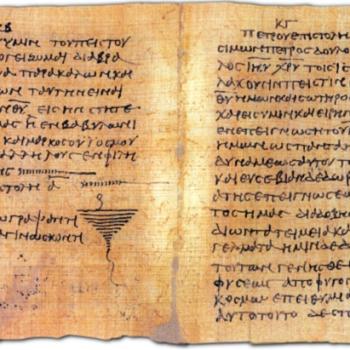You want proof that virtually nobody believes in Biblical literalism, not even the accused literalists? Try Romans 7:2: “A married woman is bound by law to her husband as long as he lives; but if he should fall asleep [literal Greek], she is freed from the law of her husband.” Some panicky husbands, afraid of losing their wives overnight, may resort to a lifetime supply of concentrated caffeine if they take this verse too literally!
Joseph and his brothers literally “got drunk” together in Genesis 43:34, a fact obscured by our translations. This verse is a classic example of what Gordon Fee taught us at Gordon-Conwell, of how we should not take a “monkey-see-monkey-do” approach when we see behavior of Biblical heroes that should not be imitated; the historical narrative here should be overridden by a clear teaching text like Ephesians 5:18, “Do not be drunk with wine.”

Also obscured in our translations is what David literally says when he swears to kill every male on Nabal’s ranch in 1 Samuel 25:22: “every one-who-urinates against a wall.” The old King James Version uses the word “p—s.” This fits with the squeamishness of the Massoretic scribes, who treat the related Hebrew noun as vulgar. Surprisingly, three times this language is quoted from the mouth of God (1 Kings 14:10, 21:21; 2 Kings 9:8).
Poll questions to see how many people read the Bible literally are bogus. The fact that anyone answers “Yes” to such questions is amazing, and may be explained by the fact that respondents are given no better options that would more accurately reflect their approach to God’s word.
Strictly speaking, genuine Biblical literalists are extremely rare. Not even the most fire-breathing Baptist believes that the Beast in Revelation 13 will be a literal snarling beast. In fact, in his book The Time Is at Hand, arch-conservative author Jay Adams finds almost nothing in Revelation that he takes literally other than the return of Christ itself.
Many accused literalists do not follow a literal six-day creation. Some have less-than-literal views of some of the large numbers in the Bible. So is literal interpretation of the Bible really the issue, or is “literalism” merely a code word for orthodoxy?
What is mistakenly called Biblical “literalism” is an approach that one might call an evangelical Ockham’s Razor: “If the plain sense of the Bible makes good sense, seek no other sense.” Such has been the “literalist” approach to sexual ethics that some so strenuously object to. An evangelical Ockham’s Razor finds the attempts to explain away the Bible’s clear teaching on sex to be much harder to believe than to accept that teaching at face value. To their credit, some progressives are courageous enough to admit this.
Ironically, an anti-literalist approach may end up taking the Bible too literally at times. The Bible says, “Do not be drunk with wine”, but does that mean it’s OK to be drunk with whiskey or marijuana? Jesus tells us not to call our neighbor Rēqa (“Emptyhead”) or Moron [literal Greek], but does that mean it’s OK to call him/her an S.O.B.? What are we to make of the Bible’s silence on sex with a minor? We dare not take that silence too literally. Worst of all, we dare not take the Golden Rule too literally; otherwise, well-meaning hosts may feed me fish because they like fish, even though I can’t stand the stuff. Such are just a few of the perils of strict literalism.
The same is true for the word inerrancy. This coming fall marks the fortieth anniversary of the Chicago Statement on Biblical Inerrancy (http://library.dts.edu/Pages/TL/Special/ICBI_1.pdf), signed by over 200 conservative scholars at the time. The statement carefully defines what people like me mean when we use the term inerrancy. Here is the key paragraph:
“We deny that it is proper to evaluate Scripture according to standards of truth and error that are alien to its usage or purpose. We further deny that inerrancy is negated by Biblical phenomena such as a lack of modern technical precision, irregularities of grammar or spelling, observational descriptions of nature, the reporting of falsehoods, the use of hyperbole and round numbers, the topical arrangement of material, variant selections of material in parallel accounts, or the use of free citations.”
One might object that if you apply such a list of disclaimers, almost any book could be said to be inerrant. What this shows is that the term “inerrancy” is actually meant to convey an attitude that treats the Bible as innocent of falsehood until proven guilty, and puts the hypothetical standard of such proof sky-high. Theoretically, you could do that for almost any book. We who like the term “inerrancy” have put the Bible in that place of authority.
So when Jesus states in Matthew 13:31-32 that the mustard seed is “the smaller of all seeds” (probably meaning “smallest,” even though a superlative does exist for this word in Greek), Biblical inerrancy does not demand precision on this point. What Jesus says is close enough that his point is valid, and he is not making a pronouncement about botanical science, anyway.
The whole issue boils down to what justifies rejection of the face value of a given scripture. On this issue, smart people can draw different conclusions without calling each other stupid. But both literalism and inerrancy need to be carefully defined. Strictly defined, nobody believes in literalism. And inerrancy only works as a meaningful term if you share the reverence for Biblical authority held by those who affirm the term, as I do.












